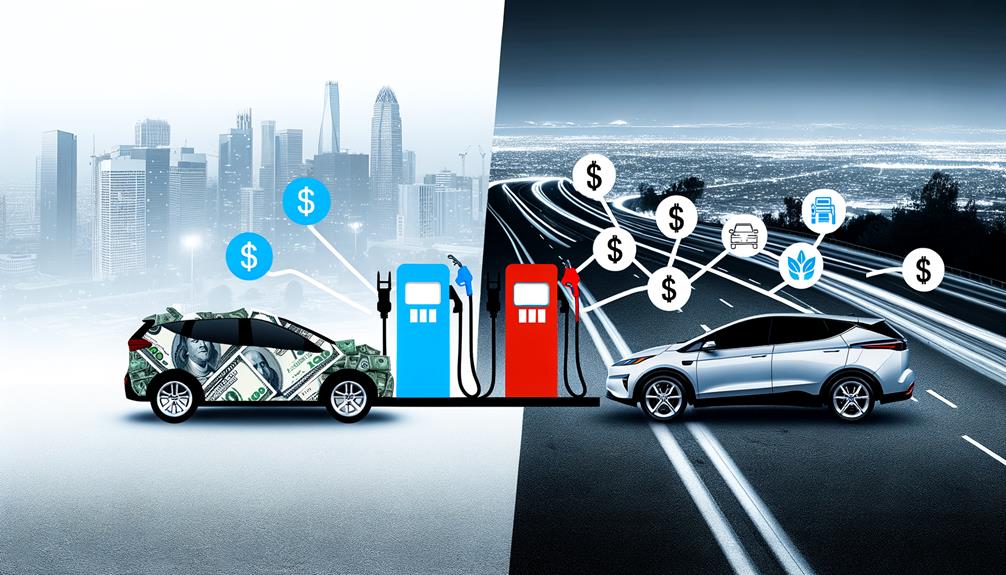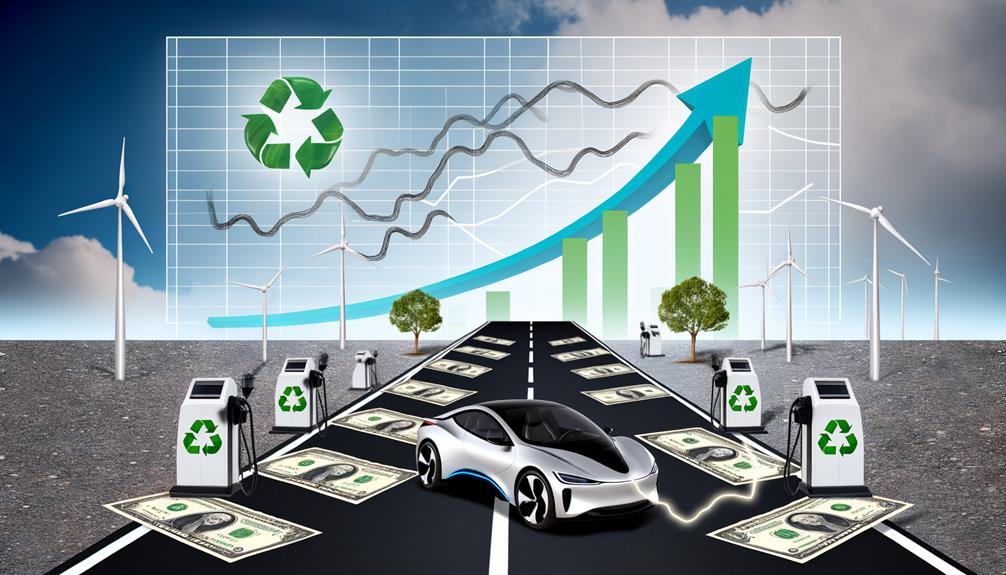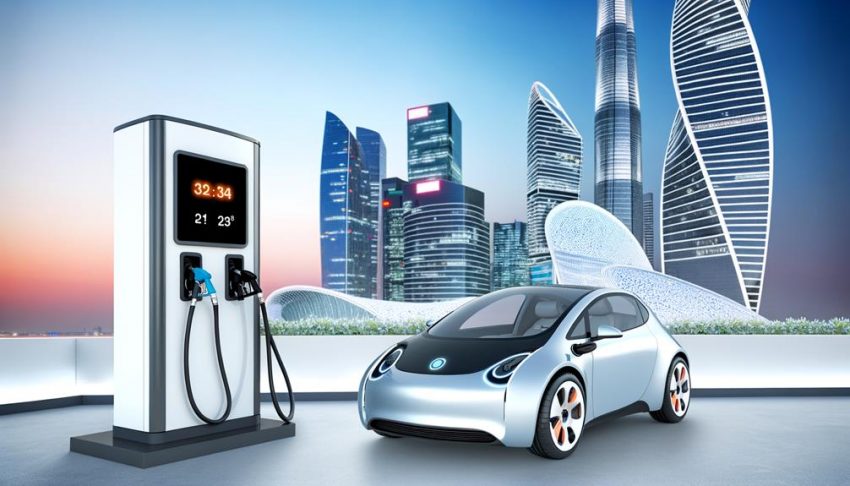When you think about switching to an electric car, you might wonder if it really saves you money in the long run. It's not just about the sticker price; you'll find that annual fueling costs can be considerably lower compared to traditional gas vehicles. Plus, electric cars often come with fewer maintenance needs, meaning fewer trips to the mechanic. And let's not forget about the various federal and state incentives available. But is the initial investment worth it, and how do energy prices and regional variations play into these savings?
Contents
Cost Savings and Financial Incentives
When evaluating the cost savings and financial incentives of electric vehicles (EVs), the numbers speak for themselves. Charging an electric vehicle can save you approximately $600 annually compared to fueling a gas vehicle. These savings in fuel costs can vary considerably by region due to differing electricity rates, but the overall trend remains clear: EVs are more economical to power.
The financial benefits extend beyond just fuel savings. The Inflation Reduction Act offers substantial federal tax credits—up to $7,500 for new EVs and up to $4,000 for used ones, depending on specific criteria like vehicle type and assembly location. Additionally, many states provide further rebates and incentives. For instance, Massachusetts offers a $3,500 tax credit for qualifying EVs, and various utility companies may provide rebates for installing home charging infrastructure, adding even more to your savings.
Maintenance costs for EVs are also considerably lower, about 50% less than those of traditional gas vehicles. This reduction comes from fewer mechanical components and the elimination of routine tasks like oil changes. Over the lifespan of an EV, these savings can add up quickly.
When you combine all these factors—reduced fuel and maintenance costs, substantial tax incentives, and rebates—the total cost of ownership for an EV is considerably lower. In fact, you're looking at potential savings between $7,000 to $11,000 over the vehicle's lifespan compared to a gas counterpart. With some areas even offering free charging stations, the financial case for switching to an electric vehicle is compelling and well-supported by data.
Reliability and Maintenance Costs
Electric vehicles (EVs) stand out for their reliability and considerably lower maintenance costs compared to traditional gas-powered cars. One of the primary reasons EVs can save you money is due to their simpler mechanical structure. Unlike vehicles with an internal combustion engine, EVs have fewer moving parts, which translates to fewer opportunities for things to go wrong and incur repair expenses.
A pivotal 2020 study found that EVs can cut repair and maintenance costs by as much as 50%. This substantial reduction is largely because EVs don't require oil changes, a routine and often expensive maintenance task for gas-powered vehicles. Additionally, the absence of components like spark plugs, fuel filters, and exhaust systems means there are fewer parts that need regular maintenance or replacement.
Further contributing to the lower routine maintenance costs of EVs is their regenerative braking system. This technology not only improves energy efficiency but also extends the lifespan of brake components, thereby reducing the frequency and cost of brake pad replacements. Established EV models, such as the Tesla Model 3 and Nissan Leaf, have shown high reliability with fewer battery-related issues, enhancing their overall cost-effectiveness.
Leasing an EV can also be a financially savvy decision. Many leasing agreements include maintenance and warranty coverage, shielding you from unexpected repair expenses. This added layer of financial protection makes EVs an even more attractive option for cost-conscious consumers.
Comparative Analysis of EVS Vs. Gas Vehicles

While the reliability and lower maintenance costs of EVs offer considerable financial benefits, it's also critical to evaluate how they stack up against gas vehicles in a broader financial perspective. When considering electric vehicles, maintenance costs are markedly lower, typically cutting repair and maintenance expenses by about 50%. This is due to fewer mechanical components and the absence of oil changes.
From a fuel savings standpoint, the average annual fueling cost for an EV is around $485, whereas gas vehicles rack up about $1,117. This translates to an estimated 60% savings on fuel for EV drivers. Over an ownership period of seven years, these fuel savings alone can accumulate considerably, contributing to long-term savings.
Initial purchase prices for EVs can indeed be higher compared to gas vehicles. However, federal tax credits of up to $7,500 for new electric vehicles can make them more financially attractive. These incentives reduce the general costs and make the initial investment less intimidating.
Over a typical seven-year ownership period, EV owners can save between $7,000 to $11,000 in total costs compared to gas vehicle owners. This includes the combined benefits of lower maintenance costs and considerable fuel savings.
Beyond the direct financial benefits, it's worth noting the environmental impact. Electric vehicles produce fewer emissions, contributing to a greener environment, which is an added advantage over gas vehicles.
Energy Prices and Regional Variations
A vital aspect of evaluating electric vehicles' (EVs) cost-effectiveness lies in understanding energy prices and regional variations. Charging costs for EVs can vary considerably across the United States, primarily influenced by electricity prices, which range from $0.14/kWh in Florida to $0.25/kWh in California. These regional variations directly impact the overall savings EV drivers can expect compared to traditional gasoline vehicles.
In areas where gas prices are high and electricity rates are relatively low, such as the West Coast, the savings potential is substantial. For instance, EV drivers in these regions can save hundreds annually on fueling costs. On average, annual fueling costs for EVs hover around $485, whereas gas vehicle owners can expect to spend approximately $1,117. A study even highlighted that home charging in Spokane, WA, can lead to annual savings of $899.
Home charging typically offers the most economical option for EV owners, often resulting in about 60% savings on fuel costs compared to gasoline vehicles. The availability of public charging stations, however, adds a layer of complexity due to their variable pricing structures. Consequently, the extent of savings potential can be greatly influenced by whether you rely more on home charging or public charging stations.
Ultimately, understanding electricity prices and regional variations is essential for evaluating the true cost-effectiveness of EVs. By examining local energy rates and comparing them to gas prices, you can better estimate your annual savings and make an informed decision on adopting an electric vehicle. The regional disparities underscore the importance of considering local factors when calculating the overall financial benefits of switching to an EV.
Long-Term Considerations and Market Trends

When considering the long-term financial benefits of owning an electric vehicle (EV), you'll find that the savings can be substantial. EV owners can expect long-term savings ranging from $7,000 to $11,000 over a typical seven-year ownership period. These savings primarily come from lower fuel costs and reduced maintenance costs, as EVs have fewer moving parts and require less frequent servicing compared to gas vehicles.
Technological advancements are also playing a significant role in making EVs more accessible. As battery technology improves and economies of scale are realized, the cost of EVs is expected to decrease, effectively narrowing the price gap between EVs and traditional gas vehicles. This trend will likely encourage wider adoption and make EVs a more attractive option for a broader range of consumers.
The market for EVs is expanding, with an increasing number of affordable options, particularly in the small SUV segment. This addresses a current gap in the market and meets the growing demand for versatile, family-friendly vehicles. Additionally, leasing EVs can offer financial flexibility, allowing you to benefit from lower monthly payments and warranty coverage while staying up-to-date with rapid advancements in EV technology.
Increased consumer awareness of the financial and environmental benefits of EVs is also driving greater market acceptance. More people are recognizing the long-term savings and the positive impact on the environment, leading to a shift in buyer preferences. As these trends continue, the market for EVs is set to grow, making them an increasingly viable and attractive choice for a wide range of consumers.
Frequently Asked Questions
How Much Money Do Electric Cars Save You?
You'll save considerably with an electric car. Consider charging station costs, maintenance savings, insurance differences, resale values, government incentives, energy efficiency, battery lifespan, and home charging. EVs vs gas cars are smart long-term investments due to these factors.
How Long Until an Electric Car Pays for Itself?
You'll break even on your electric car's initial costs in about 3 to 5 years, thanks to long-term savings on maintenance expenses, energy efficiency, tax incentives, and lower depreciation rates. Your driving habits and local charging infrastructure also matter.
Are Electric Vehicles Actually Cheaper?
You'll find electric vehicles are actually cheaper. Incentives impact initial costs, while lower maintenance costs, strong resale value, and improving charging infrastructure reduce overall expenses. Additionally, advancements in technology, energy sources, and environmental benefits enhance the ownership experience.
Is It Cheaper to Buy Gas or Charge an Electric Car?
Considering charging costs, fuel prices, and electricity rates, EVs often end up cheaper. Factor in lower maintenance expenses, government incentives, and better driving efficiency. Plus, improved resale values and charging infrastructure enhance the overall ownership experience and environmental impact.
Conclusion
In conclusion, by choosing an electric car, you'll save considerably on fuel and maintenance costs—up to $11,000 over its lifespan. Federal and state incentives further sweeten the deal, making EVs a financially savvy decision. Additionally, with energy prices and regional variations, EVs consistently outperform traditional gas vehicles. Considering long-term market trends, it's clear that investing in an electric vehicle not only benefits your wallet but also supports a sustainable future.
